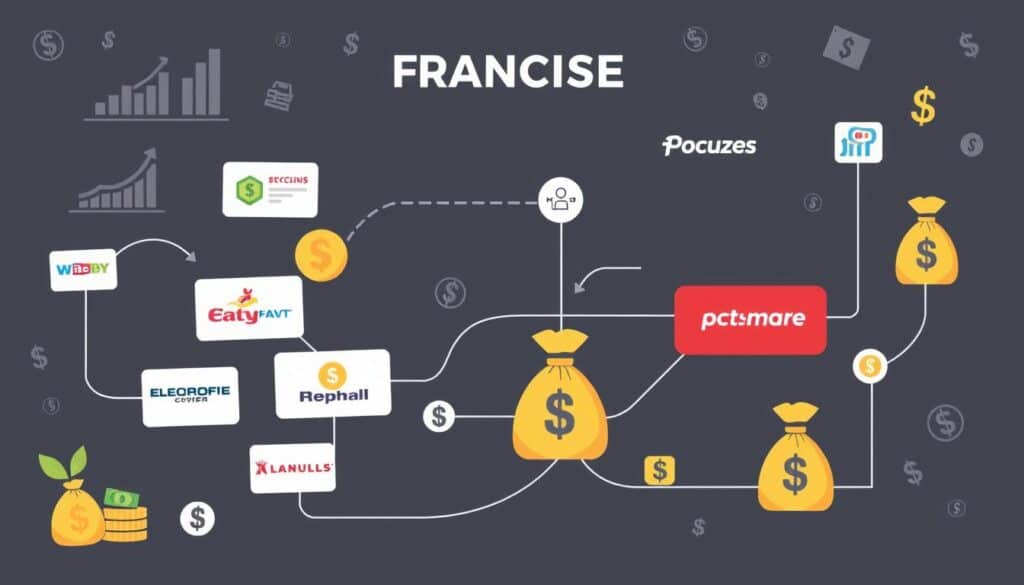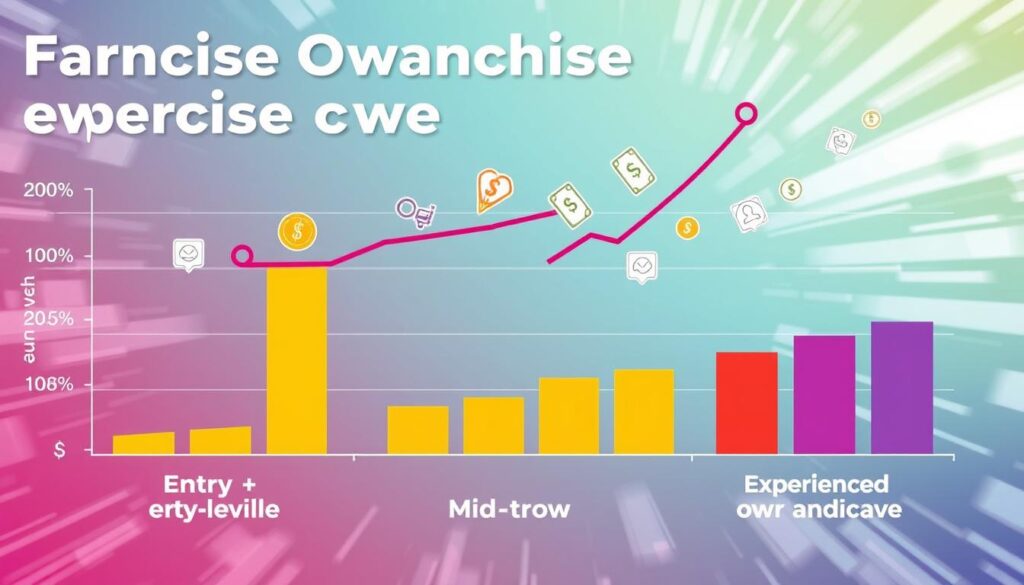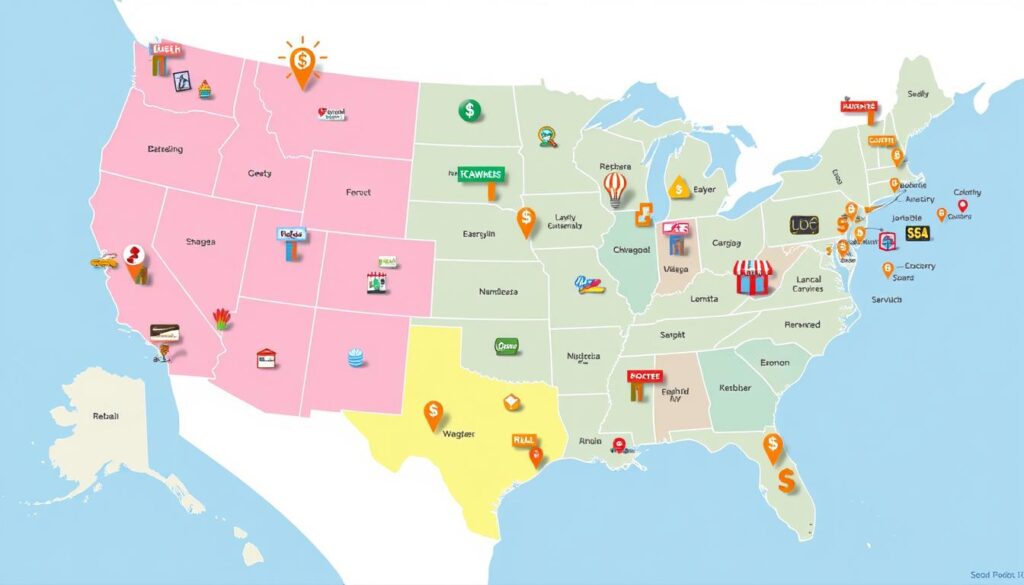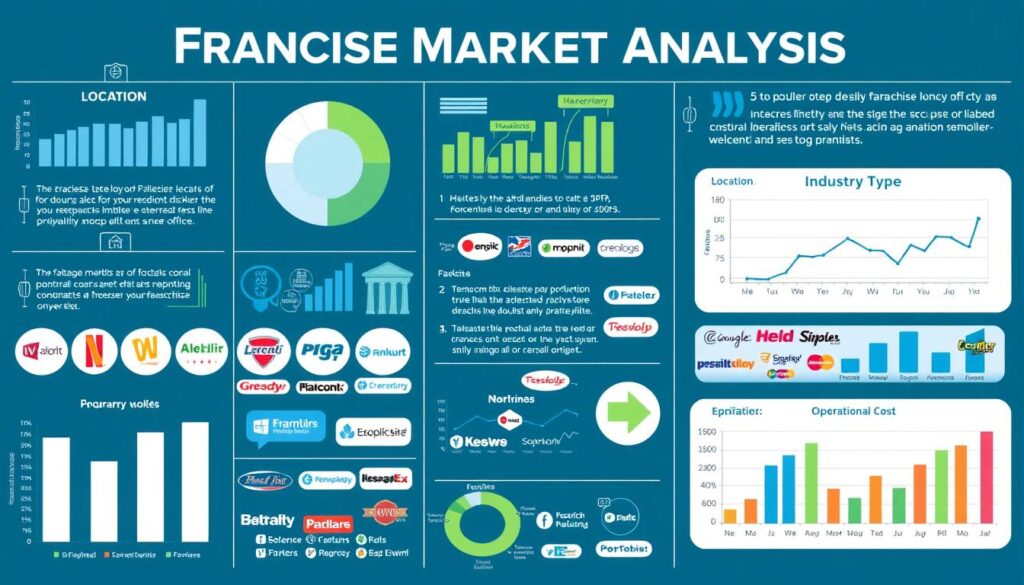Exploring franchising raises a big question: “How much can I earn as a franchise owner?” The answer varies a lot, from $39,000 to $204,800 a year. Knowing what affects your earnings can help you choose the right franchise for your financial goals.
Franchise Business Review says the average income in the U.S. is $107,119 a year. This goes up to $118,792 after you get started. So, while you might earn less at first, your income will grow as you gain experience and build your business.
Key Takeaways
- Franchise owner incomes can range from $39,000 to $204,800 annually.
- The average annual income for franchise owners is $107,119, increasing to $118,792 after the startup phase.
- Factors influencing franchise owner earnings include industry, location, experience, and the number of units owned.
- Single-unit franchise owners average $90,200 in annual income, while those with 5 or more units can earn up to $204,800.
- Understanding the franchise business model and profit margins is crucial for maximizing your earning potential as a franchise owner.
Understanding Franchise Owner Income Potential
As a franchise owner, your income depends on many things. Your daily work brings in the base income. But, profit sharing can add more to your earnings. The way you make money changes with the industry you’re in.
Mostly, you earn from selling products or services. You subtract your costs and fees from what you sell.
Revenue Generation Methods
Franchise owners use different ways to make money. These include:
- Product or service sales
- Royalty payments from other franchisees (for those with many units)
- Extra money from add-ons or related services
Income Growth Timeline
Your income as a franchise owner usually gets better with time. Businesses that are open for 2 to 10 years make about $130,000 a year. Those open for 10 years or more can make up to $177,240 annually.
About 20% of franchise owners are top earners, making more money. The other 80% make less.
“Location plays a crucial role in a franchise’s profitability, with businesses in high-growth areas likely to succeed more than those in oversaturated areas.”
Costs like fees, royalties, and insurance affect your net income. But, owning many units can bring in more money and help share costs.

Knowing what affects your income as a franchise owner helps you make better choices. This way, you can increase your earnings.
Average Franchise Owner Earnings by Experience Level
Starting your franchise journey? Knowing how experience affects earnings is key. The data shows a strong link between experience and financial success.
Newbie franchise owners can earn about $49,588 a year. But, those with 2 or more years of experience make around $115,688 annually.
Managing more units boosts earnings even more. Owners with 2-4 units average $142,638 a year. Those with 5 or more units can earn up to $214,418.
Your business skills and how well you use the franchise system matter a lot. Improving your skills can lead to more money.
| Experience Level | Average Annual Earnings |
|---|---|
| Novice (0-2 years) | $49,588 |
| Experienced (2+ years) | $115,688 |
| Multi-Unit (2-4 units) | $142,638 |
| Multi-Unit (5+ units) | $214,418 |
Experience greatly affects franchise success rates and franchise investment returns. Knowing this can help you plan for financial success.

“The key to unlocking higher earnings as a franchise owner lies in your ability to leverage the system and continuously expand your knowledge and operational expertise.”
How Much Do Franchise Owners Make
As a franchise owner, your earnings can change a lot. It depends on many things. From running one place to many, the money you can make is big. Let’s look at what different types of franchise owners make.
Single Unit Owner Income
On average, single-unit owners make about $102,910 a year. This number is the average for the whole industry. But, how much you make can change based on where you are, how well-known your brand is, and how well you run your business.
Multi-Unit Owner Earnings
Those with more than one unit make more money. Owners of 2-4 units earn about $142,638 a year. And, those with 5 or more units can make up to $204,800 a year.
Industry-Specific Income Ranges
How much money you can make also depends on your industry. For example, senior care franchises make about $155,132 a year. Personal services franchises make $126,070, and pet services franchises make $119,231. But, fast-food franchises usually make around $82,000 a year.
“The average franchise owner’s salary is just over $64,000 annually, but the potential for higher earnings is significant, especially for those who expand into multi-unit operations or specialized industries.”
The franchise owner salary and franchise profitability depend on many things. These include the cost to start, how well you run your business, and what people want. By thinking about these things, you can choose the best way to make more money.
Top-Performing Franchise Industries and Their Income Potential
Are you thinking about starting a franchise? You might wonder which ones can make you the most money. Luckily, many franchise sectors are known for their strong financial performance. This makes them great choices for investors.
Senior care is a top choice, with owners making about $155,132 a year. This industry meets the increasing need for elder services. Business services franchises also do well, with owners earning around $122,394 annually.
Personal services, like coffee shops, are another profitable area. Owners can make about $126,070 a year. The coffee industry is especially strong, with Americans spending nearly $110 billion on coffee in 2022.
Consider sports and recreation franchises, like pickleball, for new opportunities. These have IRRs of 21% to 25%, showing they’re growing fast.
“The most profitable franchises are 66.3% more likely to succeed than the average small business.”
When looking at franchises, think about more than just money. Look at market trends, competition, and your skills. By doing your homework and choosing the right franchise, you can increase your chances of success.

Geographic Impact on Franchise Owner Income
The place where a franchise is located can greatly affect how much money its owners make. Places in cities usually have more customers and more people walking by. But, they also have higher costs like rent and paying employees.
Urban vs. Rural Location Earnings
Franchise owners in cities might make more money overall. But, they might not keep as much of it because of the high costs. On the other hand, franchises in rural areas have lower costs. Yet, they might find it harder to get as many customers as city franchises do.
Franchise owners need to think about the market and costs in different places. They should pick the best location for their business.
State-by-State Income Analysis
Looking at franchise owner incomes by state shows big differences. For example, in Minnesota, owners make an average of $119,885 a year. This makes Minnesota one of the top states for earnings.
Other states like New York, New Jersey, and Massachusetts also have high earnings. Owners in these states can make between $65,000 and $75,000 on average.
Regional Market Factors
There are also regional factors that affect franchise profits. These include how many people live in an area, the local economy, and how much competition there is. Franchise owners need to study these factors to choose the best place for their business.
By understanding how location affects earnings, entrepreneurs can make more money. This helps ensure their franchise does well in the long run.

Initial Investment and Its Relation to Earnings
Starting a franchise can cost a lot, from $518,500 to $761,500. This money goes towards fees, improvements, equipment, and more. But, how much you earn back isn’t always clear.
More money upfront might mean more earnings, but it also means more risk. It’s key to study the Franchise Disclosure Document (FDD) to understand this link.
On average, franchise owners in the U.S. make about $80,000 before taxes each year. Only 7% make over $250,000. Yet, 51% earn less than $50,000. The top 10% make around $62,000, while the bottom 10% make about $39,000.
Earnings can also depend on where you are. For example, in New Jersey, owners make about $75,454. In Rhode Island, it’s $71,089, and in New York, $72,095.
Different industries and franchises have different costs and earnings. It’s vital to research and understand the FDD well to grasp the investment-to-earnings ratio.

“The average Maids franchise owner makes about $1.1 million in annual revenue, with the most successful franchise raking in $6.5 million last year.”
For example, Burger King franchises in 2020 made a median of $1,351,000. Owners could make about $175,630 a year. The initial investment ranges from $230,000 to $4,194,700.
When looking at a franchise, consider the initial cost and what you might earn. Do your homework, analyze the industry, and understand the FDD to make a smart choice. This way, you can increase your chances of financial success as a franchise owner.
Understanding Franchise Fees and Royalty Structures
When you’re thinking about becoming a franchise owner, it’s key to know about the fees and royalties. These include an initial fee, ongoing royalties, and marketing contributions. Understanding these costs is vital for planning your finances well.
Ongoing Operational Costs
Franchise owners also face ongoing costs like rent, utilities, and payroll. These expenses can greatly affect your profits. It’s important to include them in your financial plans.
Fee Impact on Net Income
The fees you pay can really affect your net income. Royalties usually range from 4% to 12% of your sales. Knowing the fees of a franchise helps you see if it’s a good investment.
| Fee Type | Typical Range | Example Impact |
|---|---|---|
| Initial Franchise Fee | $20,000 – $50,000 | Can exceed $100,000 for Master Franchise purchases |
| Marketing Fee | Around 2% of monthly revenue | $6,000 annually based on $25,000 monthly revenue |
| Royalty Fee | 4% – 12% of gross sales | 5% royalty on $1.5 million in revenue = $75,000 annually |
Knowing the franchise royalty fees and franchise operational costs helps you see if a franchise is right for you. It lets you make a choice that fits your financial plans.
Multi-Unit Ownership Income Benefits
Expanding your franchise beyond one unit can greatly increase your income. Multi-unit ownership brings many benefits that can significantly boost your earnings. Owners with 2-4 units make about $132,400 a year. Those with 5 or more units can earn up to $204,800 annually.
Key benefits include economies of scale, increased brand recognition, and streamlined operations. By sharing resources, costs per unit go down, leading to higher profits. A larger area and more customers also mean more chances to make money.
But, multi-unit ownership also has its challenges. It requires a lot of money, strong management, and a good team. Franchisors often give more support to multi-unit owners to help the brand grow.
There are at least 43,230 multi-unit franchisees in the U.S. with 227,244 locations. This number is growing. Multi-unit owners make up over 54% of the franchise industry.
| Franchise Ownership | Average Annual Income |
|---|---|
| 2-4 Units | $132,400 |
| 5+ Units | $204,800 |
Multi-unit ownership offers great income potential and scaling benefits. It’s a good choice for entrepreneurs wanting to grow their business and earnings. By using multiple locations, owners can achieve financial success and better operations.

Key Factors Affecting Franchise Profitability
Investing in a franchise can be very profitable. But, how much money it makes depends on a few important things. Two big factors are market competition and brand recognition.
Market Competition Analysis
Before choosing a franchise, it’s key to do a deep franchise market analysis. You need to look at how many other businesses are in the area. Also, check if there’s room to grow. If there’s too much competition, it can be hard to keep customers.
Brand Recognition Impact
The strength of a franchise’s brand value is very important. Famous brands like McDonald’s or Subway usually have more customers. This means more money for the franchise.
Also, the franchise’s marketing and advertising support helps a lot. Good marketing can bring in more customers. This can make the franchise more profitable. So, investing in marketing is very important.

Franchise success is about more than just one thing. Market competition, brand strength, marketing, and how well the franchisee runs the business all matter. Prospective franchisees need to think about these things carefully. This way, they can make smart choices and do well.
Income Potential in Different Business Service Sectors
If you’re thinking about a business service franchise, you’ll find it very profitable. These franchises make about $122,394 a year. They offer many services like consulting, marketing, and ways to save money.
P3 Cost Analysts is a great example. It helps businesses cut costs. With a model that grows and a big need for cost savings, P3 Cost Analysts can make a lot of money. Since they deal with businesses, they often have more stable income and higher profits than those that sell to consumers.
“The B2B nature of these franchises often leads to more stable income streams and higher profit margins compared to consumer-facing businesses.”
The income from business service franchises can be very good. By using their special skills and a well-known brand, franchise owners can make a lot of money. If you like consulting, marketing, or saving money, this industry is a great chance to start a successful business.
| Franchise | Average Annual Gross Revenue | Initial Investment |
|---|---|---|
| P3 Cost Analysts | $122,394 | $350,000 – $450,000 |
| Wayback Burgers | $1,417,443 | $350,000 – $450,000 |
| Chick-fil-A | $4,160,000 | $10,000 |
| McDonald’s | $2,815,000 | $1,877,600 – $3,283,600 |
| Dunkin’ Donuts | $100,000 | N/A |
| Subway | $400,000 | N/A |

Personal Services Franchise Income Analysis
Thinking about a personal services franchise? You’ll find the income potential impressive. These franchises make an average of $126,070 a year. This includes businesses like beauty salons, fitness studios, and cleaning services.
More people want these services as their income grows. They look for ways to improve their lives. This demand is a great chance for franchise owners to make money.
But, how much you make can change a lot. It depends on where you are, how much competition you face, and how well you manage your business. Some franchises might make a lot more or less than the average.
To do well, you need to research the market and pick a strong brand. You also need to know how to run and grow your business. With the right approach, you can succeed and earn well from your franchise.
| Franchise Sector | Average Annual Income |
|---|---|
| Senior Care | $155,132 |
| Real Estate | $152,852 |
| Personal Services | $126,070 |
| Business Services | $122,394 |
| Pet Services | $119,231 |
The table shows the average income in different franchise sectors. It highlights the good earnings in personal service franchises and other lifestyle businesses.
“Owning multiple franchise locations is a proven strategy for generating life-changing income. The key is to choose the right brands, manage them effectively, and scale your operations over time.”
This section shows the big income chances in personal service franchises and lifestyle business income. Knowing the market and how to run a franchise well can lead to success and a good lifestyle.

Senior Care Franchise Earnings Potential
The senior care franchise industry offers great income potential for its owners. These businesses are among the top earners, with an average annual income of $155,132. This is due to the increasing need for elder care services and the vital role they play.
Market Growth Factors
The senior care franchise market is set for significant growth. This is because of an aging population and the rising need for in-home care and nursing homes. The U.S. population aged 65 and over is expected to double by 2060. This means a 25% growth in jobs for home health and personal care aides from 2020 to 2030.
Revenue Streams
Senior care franchises have various income sources. These include in-home care, nursing homes, senior living relocation services, and specialized healthcare. These services are crucial, leading to high earnings for these franchises. They can make between $1 million and $5 million annually, with an average of $1.5 million to $2.5 million. Successful franchises can also see net profit margins of 10% to 15%, resulting in average net profits of $150,000 to $375,000 annually.
The senior care franchise industry is growing fast and is essential. This makes it a great investment for entrepreneurs looking for senior care franchise profits and stable healthcare franchise income.
Maximizing Franchise Owner Income
As a franchise owner, making more money is key to your business’s success. Use smart cost control, local marketing, and top-notch customer service. This way, you can boost your profits and grow your business.
Streamlining your inventory is a smart move. Keep an eye on your stock and cut down on waste. This can lower your costs and increase your earnings. Also, using energy-saving tech like LED lights can cut down on utility bills.
Upselling and cross-selling are great ways to make more money. Teach your team to suggest extra products or services. This can make customers happier and increase your sales. Also, investing in your team’s growth can make your franchise more profitable.
Always keep learning and stay up-to-date with market trends. This is crucial for keeping your franchise profit optimization and franchise business growth going strong. Keep an eye on your competitors and adjust your plans as needed.
“The secret to my success? I never stop learning. I’m constantly adapting my business model to meet the changing needs of my customers and the market.”
– Successful Franchise Owner
By using these strategies, you can increase your income as a franchise owner. This will help your business grow and thrive in the long run.
Financial Performance Metrics for Success
As a franchise owner, it’s key to watch your finances closely for success. Important metrics include franchise financial KPIs like gross sales, net profit margins, and return on investment (ROI). Also, keep an eye on customer acquisition costs.
A profit margin of 10% to 20% is often seen as healthy for franchises. Regularly analyzing your finances and franchise performance tracking against benchmarks can show where to improve. It can also reveal new growth chances.
| Metric | Description | Benchmark |
|---|---|---|
| Gross Sales | Total revenue before expenses | Varies by industry |
| Net Profit Margin | Revenue left after all expenses | 10% to 20% |
| Customer Acquisition Cost | Cost of getting a new customer | Varies by industry |
| Return on Investment (ROI) | Profitability compared to investment | Varies by industry |
Tracking these franchise financial KPIs and franchise performance tracking metrics helps owners make smart choices. This can lead to better operations, higher profits, and lasting success.
“Many emerging franchisors and established brands struggle to collect all the required data from franchisees as per franchise agreements, as highlighted by Michael Iannuzzi from Citrin Cooperman.”
It’s vital for franchise owners to regularly analyze their finances and compare them to industry standards. This helps them fully understand their business’s performance. It also shows where they can get better.
Conclusion
Franchise ownership can lead to big profits, with earnings from $102,910 to over $200,000 for those with many units. Success depends on many things like the industry, location, and management skills. It also requires following the franchise’s rules closely.
Starting a franchise comes with costs and fees, but it offers a tested business plan and support. This can help you succeed.
Thinking about getting into franchising? It’s important to do your homework and have realistic hopes. The franchise world offers a chance to own a business with help and a known brand.
Knowing how much money you can make and what it takes to succeed is key. This way, you can decide if franchising fits your business dreams and financial goals.
Franchise ownership can be a good way to make money, but you need to think carefully. Look at the franchise, your skills, and the market. With the right approach, you can build a successful and profitable business.
